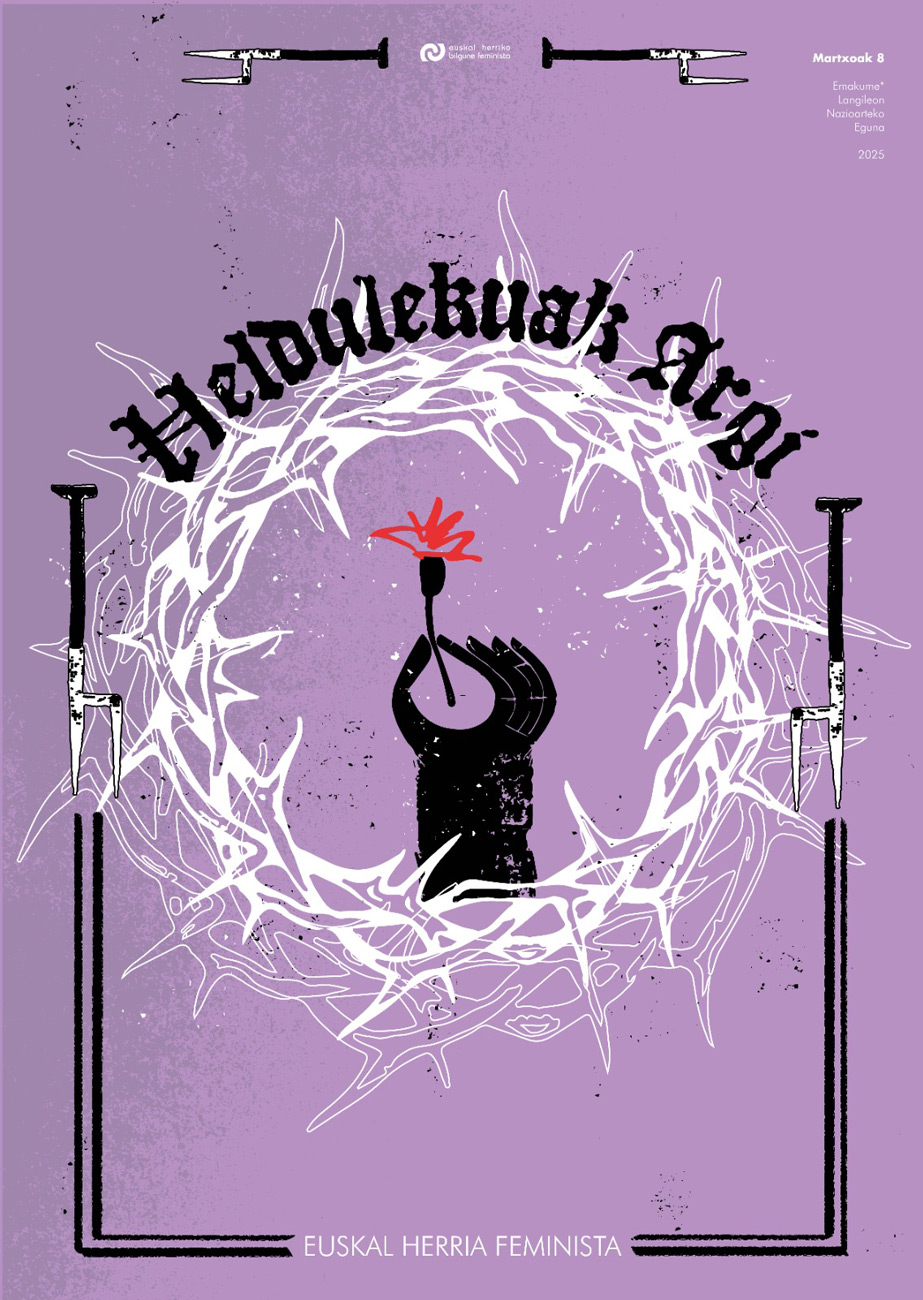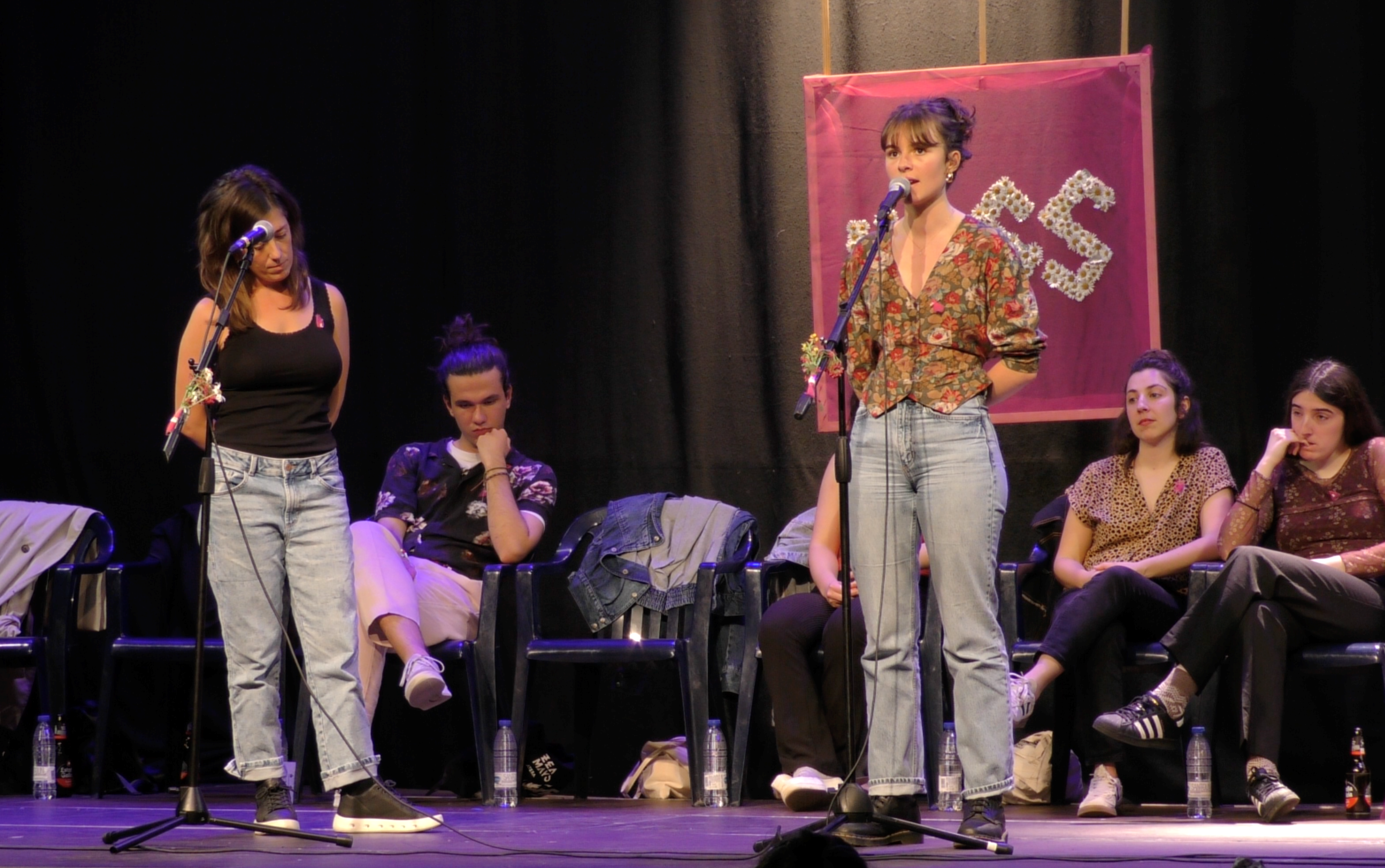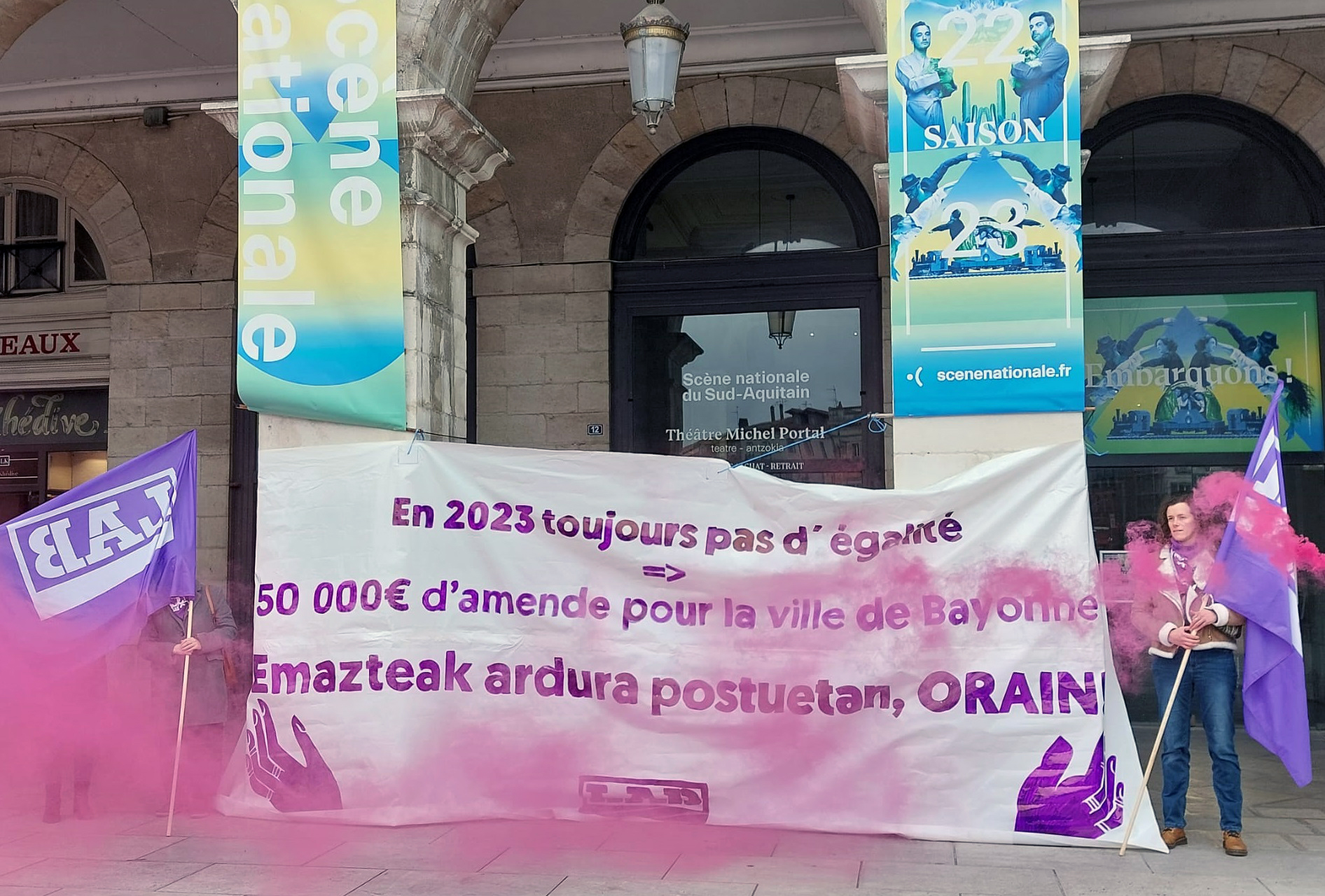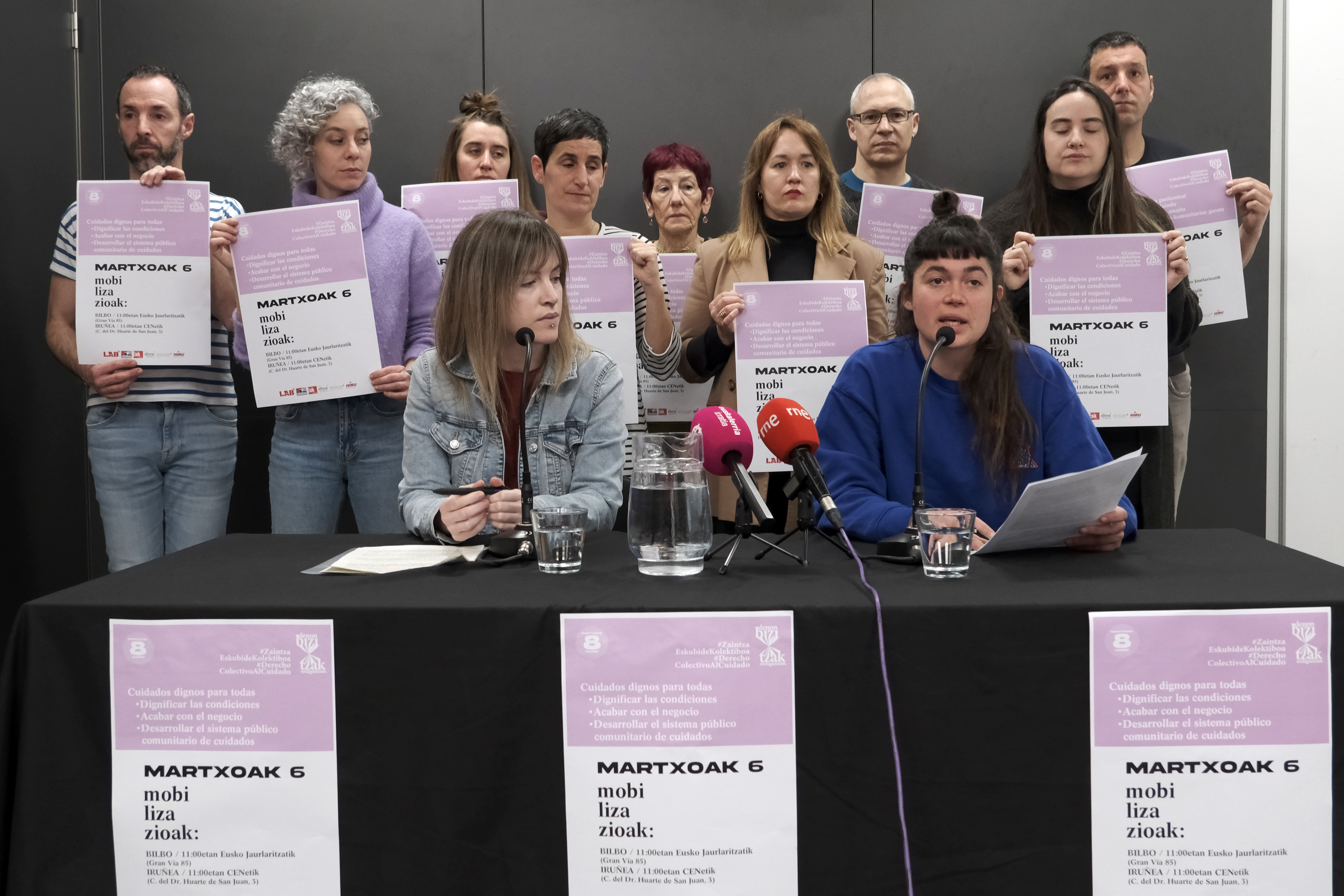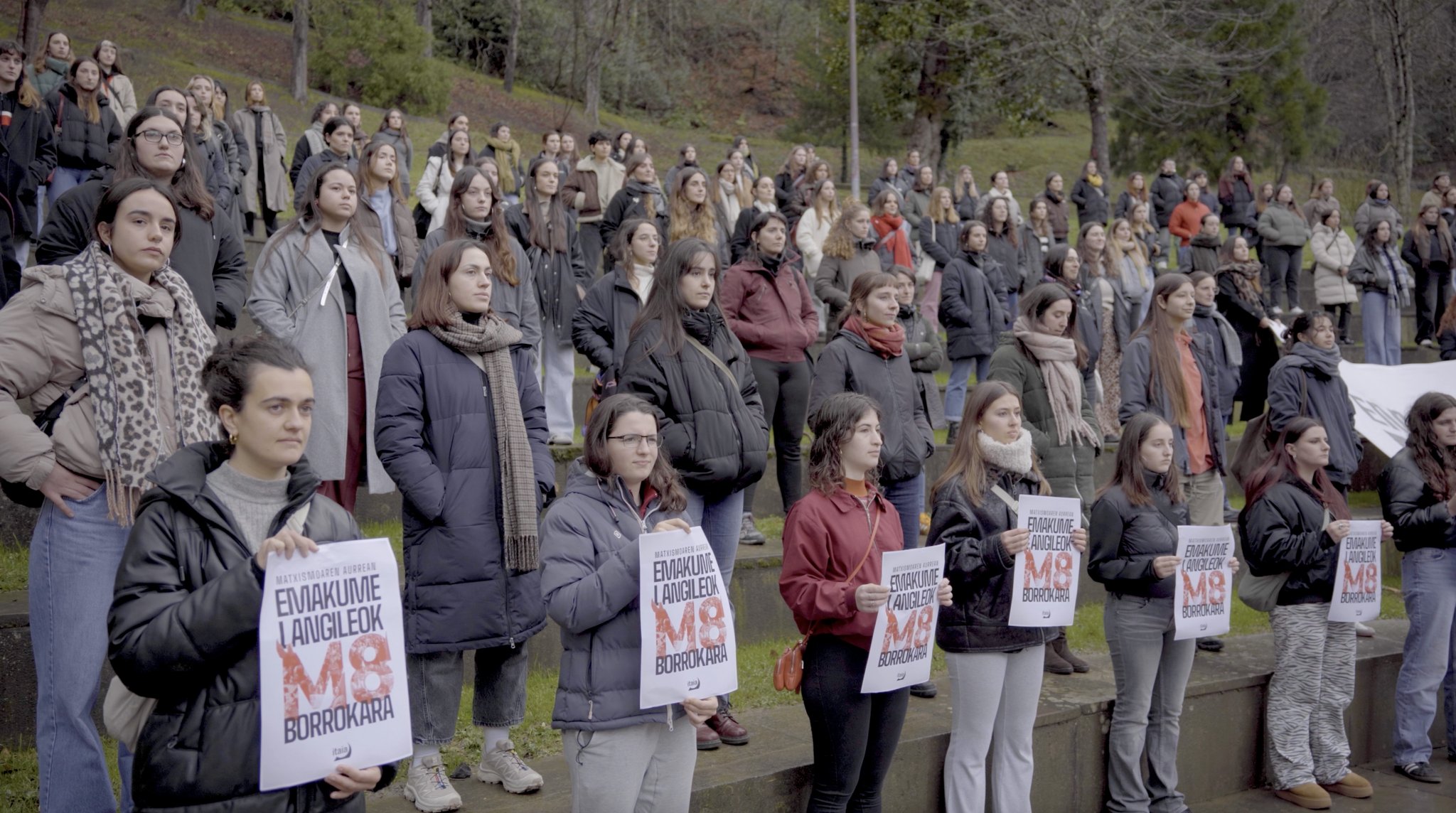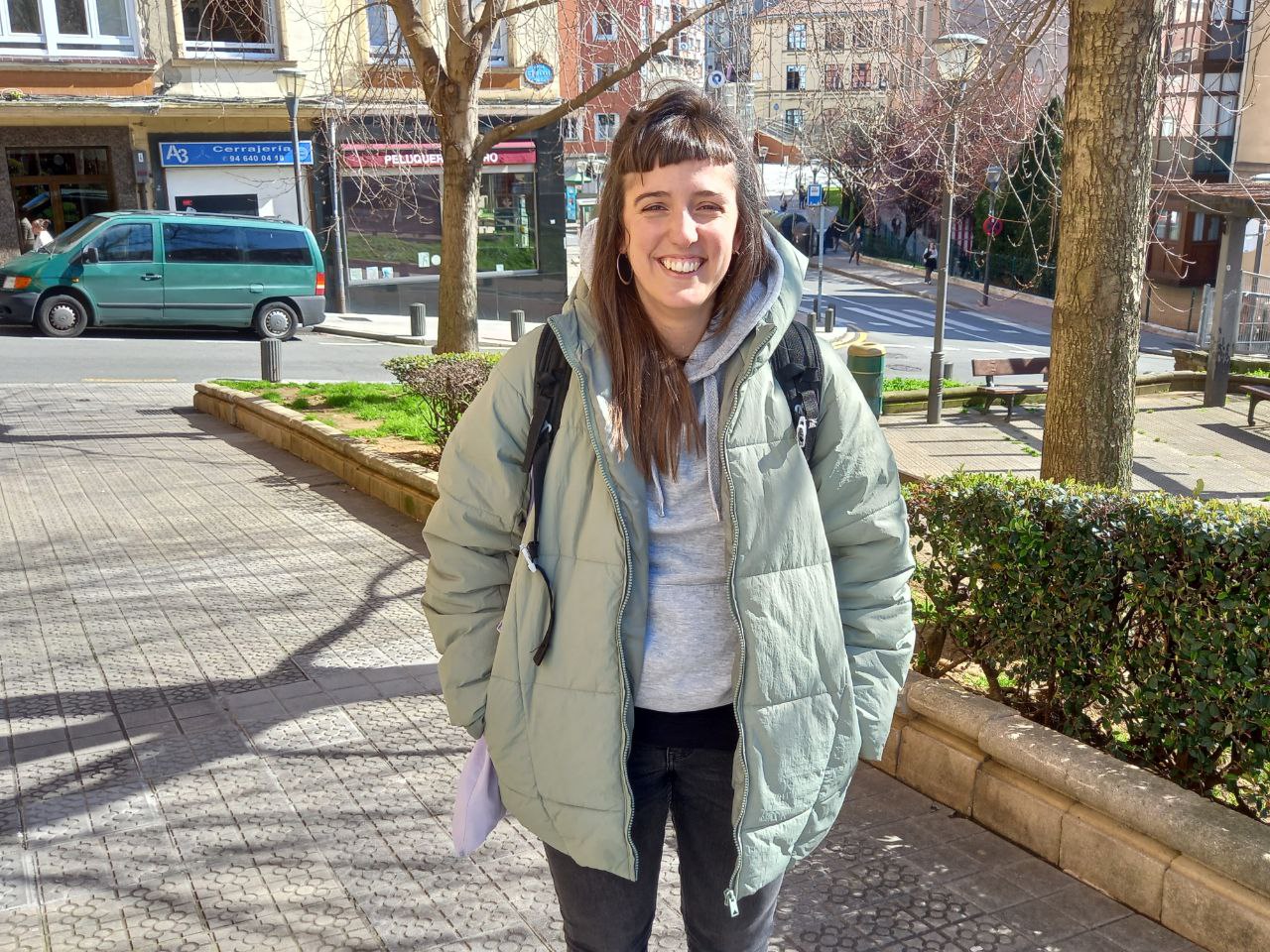Women fighting, ignored institutions
- March 8 is an important day for the feminist movement, and following the wave of recent years, hundreds of towns and cities will refill their streets claiming the rights of working women. In the framework of the general strike of 30 November, it will be the day of the claim of public and collective right to custody in Hego Euskal Herria, but also against male violence. At Iparralde they have focused on self-defense and feminist organization, and they want to take advantage of the day to reinforce and articulate the feminist movement. Demonstrations will take place on Friday afternoon.

March 8 "more than celebration is a day of struggle and denunciation". The Feminist Movement of the Basque Country has made the objective of the day clear. In recent years the international day of working women has also become particularly important in the Basque Country, and since the massive day of the 2018 strike, feminist demands have been strongly heard in hundreds of towns and cities. Another year they have called to go out on the street under the slogan No to negotiate with our lives, claiming the rights of working women, community public surveillance and the fight against male violence. The main calls of the capitals of the Feminist Movement are: Baiona at 18:00 from the Plaza de la Casa Consistorial, Bilbao at 19:00 from the Plaza Sagrada Corazón, Donostia at 18:30 from the Old Tunnel, Vitoria-Gasteiz at 18:00 from the Plaza San Antón and Pamplona at 19:00 from the Parque Anttti. Demonstrations have also been organized in various localities.
The general feminist strike on 30 November marked a milestone and was ratified by the Denon Bizitzak Erdigunea platform at the press conference on 20 February. They stress that many local assemblies created for the strike continue to work and that the Feminist Movement is "eager and ambitious": "It has activated the assemblies, it has strengthened the desire, it has ignited some networks", explains Ainhoa Olaso. They say they continue to take steps towards public and community surveillance, boosting local dynamics and disseminating the People's Agreement. Olaso has recalled that the strike work has served to strengthen the alliances of the Feminist Movement and that they are willing to influence decision-making spaces together with associations of domestic employees, unions, sex workers and social agents.
In fact, the Denon Bizitzak Erdigunea platform has made a negative reading of the institutions' attitude: "The answer we have received from the institutions has not been the one we needed. They disregard the voice of those of us who are concerned, they do not value the general feminist strike." They claimed the Community public surveillance system on the A30, but Olaso says that the institutions have not taken their demands into account: "They are not interested in questioning or changing their policy. It's clear what your choice is between our lives and capital."

Precarious working women
In the M8 the feminists will continue to question institutions and organizations, and under the motto "There is no business with our lives" they will ask that it be held responsible: "Unfortunately, custody is not the only issue that exists in the mercantilist logics, all the basic needs to live are mercantilized, food, housing, health… is enough!". They criticize the custody pact approved in the CAV and accuse the government of the "attempt to appropriate the discourse" of the Feminist Movement. They send a message to the Government and the Government of Navarra saying that they do not want a pact if they do not meet the following requirements: to speak against the publication and privatization, even to end the Aliens Act, among others. They require the pact to include "concrete plans and budgets" to meet these requirements.
The Feminist Movement of Euskal Herria has recalled that the heteropatriarchal capitalist system exploits the workforce of women in various ways: "In employment, in feminized work, even in the care we do for free and without recognition. This condemns us to live directly in precariousness and continuous oppression." They denounce the sexual division of labour and stress that women receive the lowest pensions and that there is a wage gap. Women earn 7,000 euros less a year than men in Hego Euskal Herria, according to 2020 data.
They call to articulate feminist self-defense in Iparralde to strengthen the feminist movement.
The Baiona Manifeminist Group has also called, through an open letter, for the promotion of labour and custody rights in Iparralde. To be a "real balance" between life and work, institutions have been asked for "bold" resources, such as "accepting the father's status at home through a minimum educational wage".
Feminist struggle for all oppressed
The Feminist Movement will use 8 March to recall the rights of women in particularly vulnerable situations, those who have had to migrate to Europe and those who suffer violence and racism as a result of the Foreign Affairs Act, both in the field of labour and in the field of male violence. They will also try to denounce the genocide being carried out by Israel and to convey from Euskal Herria solidarity and affection towards Palestine, "today especially to Palestinian women".
The Baiona Manifeminist Collective invites "all the women and oppressed in the world" to join the struggle: "All who break the norm, we are together in this struggle." Irantzu Idoate, who has worked in the preparation of mobilizations, has focused on self-defense and feminist organization in Iparralde. March 8 is taken as a starting point for joining forces, and after the demonstration a cultural offer will be offered to strengthen relations between feminists: "We hope it will be a first step to activate the feminist movement on a regular level and not only on March 8 or November 25." Idoate has stressed that many feminists are "wishing" the struggle, but are aware that they do not have the stability of the feminist movement of Hego Euskal Herria. On Friday, however, they are awaiting a massive and wide-ranging demonstration, bearing in mind that in the French State it is also a day of strike, and the interunion has also joined the strike. "We are going to go on a work strike, a home strike, a body strike and a consumer strike," said Iparralde organizers.
.jpg)
Several groups have participated in the organization of the mobilization of Bayona, from different lines and ideologies, but Idoate has emphasized that they have given importance to the common reading, although they have found "difficulties" and "differences" in this work: "The balance has been sought among all". The open letter they have published is a clear call to join the struggle, and they address their "sisters and peers," to "rise together," to articulate feminist self-defense.
Within the framework of the M8, they have elaborated an extensive list of demands, among which they have called for an egalitarian education to "guarantee equal opportunities and dispose of content without gender dichotomy", the right to abortion "guarantee where necessary" the right to freedom of the body, assisted reproduction and the insufficiency of contraceptives for all, the responsibility of the authors of the machista and feminicide violence, and the violation of the French neo-capitalist neo-capitalist neo-capitalist system.
Itaiak, called to build a socialist state
The socialist women's organization Itaia has also announced mobilizations for March 8: "Towards the construction of a socialist society that will lay the foundations for ending the oppression of working women". Itaia warns that although society is making us believe that it is increasingly progressive, working women are still repressed: "Structural arrest, burden of home care, male violence, objectification of our bodies...". It denounces that employers make "savage exploitation" against working women.
Moreover, the members of Itaia remember that oppression is normalized in society and that reactionary and macho ideas have spread. They stress the need to choose "independent political force", seeing that "capitalist institutional policies" do not respond to the interests of working women, but to the needs of the powerful and middle-class women.
Mobilisations will be held in Araba, Vitoria-Gasteiz; Bizkaia, Bilbao, Portugalete, Basauri, Gernika and Durango; Gipuzkoa, Mutriku, Donostia-San Sebastián, Azpeitia, Azkoitia, Zestoa, Bergara, Irun, Zarautz, Tolosa.
Mugimendu feministak manifestazioak egin ditu goizean Donostian, Gasteizen eta Iruñean eta arratsaldean Baionan eta Bilbon. Oinarrizko irakurketa partekatu dute, eta horri gehitu diote hiri bakoitzean bertako problematika, eragile eta ekimenen erreferentzia.
Bilgune Feministak Heldulekuak argi, Euskal Herria feminista leloa baliatu du M8an, azpimarratzeko feminismoak ematen dituela “datorrenari aurre egiteko tresnak”, eta gogorarazteko faxismoaren gorakadaren testuinguru hau helduleku horretatik irakurri eta borrokatu... [+]
Festa egiteko musika eta kontzertu eskaintza ez ezik, erakusketak, hitzaldiak, zine eta antzerki ikuskizunak eta zientoka ekintza kultural antolatu dituzte eragile ugarik Martxoaren 8aren bueltarako. Artikulu honetan, bilduma moduan, zokorrak gisa miatuko ditugu Euskal Herriko... [+]
“Kasu, ez gitxu lo!”. Gure denbora eta manerekin baina heldu gira.
Azaroaren 25ean Baionako elgarretaratzera joan ez joan eta autoak nola partekatu pentsatzetik (joan-jina bi oren), bat-batean Lartzabalen elgarretaratze bat antolatu genuen, eta 47 emazte bildu!... [+]
Nahiz eta Nazio Batuen Erakundeak (NBE) 1977an nazioarteko egun bat bezala deklaratu zuen eta haren jatorriaren hipotesi ezberdinak diren, Martxoaren 8aren iturria berez emazte langileen mugimenduari lotua da.
Euskal Herriko Bilgune Feministak deituta elkarretaratzea egin dute Hernanin Iratxe Sorzabali elkartasuna adierazi eta "babes osoa" emateko. Inkomunikatuta egon zen uneak berriz ere epailearen aurrean kontatu behar izatea, "bizi izandakoak utzitako ondorioen... [+]
Martxoaren 6an 11:00etan Bilbon eta Iruñean mobilizazioak egingo dituzte sindikatuek, patronalak eta Eusko Jaurlaritza zein Nafarroako Gobernua interpelatzeko, zaintza eskubide kolektiboari dagokionez.
Martxoaren 8a hurbiltzen ari zaigu, eta urtero bezala, instituzioek haien diskurtsoak berdintasun politika eta feminismoz josten dituzte, eta enpresek borroka egun hau “emazteen egunera” murrizten dute, emakumeei bideratutako merkatu estereotipatu oso bati bidea... [+]
Martxoak 8aren izaera iraultzailea berreskuratzeko deia egin du Itaia emakumeen antolakunde sozialistak. Irene Ruiz Itaiako kideak azaldu digunez, “oldarraldi erreakzionarioaren eta matxismoaren aurrean proposamen iraultzailea hauspotu eta kontzientzia sozialista... [+]
Martxoaren 8an kalera ateratzera deitu ditu herritarrak mugimendu feministak, "desberdinkeriek bere horretan" dirautelako. Zapalkuntza mekanismo berriak agertu direla salatu dute, eta feminismoa "ezkerreko borroken erdigunera" eramateko beharra aldarrikatu.
The elegant old woman crossed over our husband's arm. Known from sight, I saw that I was a little wrong, the strokes of age. A real lady eibarresa: a pearl necklace, which with her hair carved and proud, being Friday, knew she was in the morning in the hairdresser. This is a very... [+]
In Euskal Herria, we are talking about the care model. We continue to denounce privatization by claiming the need for a public system. We are building alliances to eradicate the racist system. We are questioning models of governance and demanding other models. We have the... [+]












